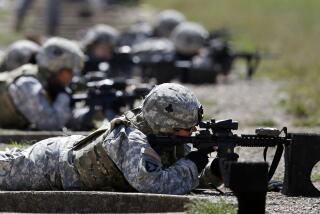Drill Sergeants Are People Too, Says an Army Trying to Help Them Cope
- Share via
COLUMBUS, Ga. — Despite their tough-guy image, Army drill sergeants have emotions like anybody else. You don’t believe it? The Army says so, and it also says drill sergeants can suffer from job-related stress.
“We have the image of drill sergeants as rough, dominant, hard-driving, who can bite nails in half. That guy is also a human being,” said Sgt. Maj. James Williams of the Infantry Training Center at Ft. Benning.
Now the Army is trying to help the sergeants cope with 14-hour days, family responsibilities and job pressures through a stress management program that started at Ft. Benning last month.
Two other training posts, Ft. Sill, Okla., and Ft. Leonard Wood, Mo., have similar programs.
At Ft. Benning, 51 drill sergeants and 18 wives spent most of one recent day discussing problems in group sessions. The meetings were moderated by mental health professionals assisted by the chaplain.
Williams said the wives learned about the dedication and responsibilities of drill sergeants, and the husbands learned about the importance of communicating with their wives.
The seminars will be scheduled quarterly for drill sergeants who have been on the job between nine and 12 months, Williams said. Wives are encouraged to attend.
“We want to know if we’re doing anything wrong, or if there is something we can do to assist them,” Williams said. “We try to find out if there are stress factors. A person could have stress and not know it. We make them aware of the indicators.”
Staff Sgt. Chester Bullard, 29, who is in the 10th month of a two-year tour as a drill sergeant, said he and his colleagues have to be stern to maintain discipline and ensure that recruits meet training goals.
Bullard and two other drill sergeants are responsible for 56 recruits, who may turn to them for help resolving personal problems that could affect their performance in basic training.
“The image is a tough guy,” said Bullard, a bachelor. “But there are times you have to talk to them one-on-one and tell them, ‘Hey, I’m human too. I’ve been through those problems. I was a private.”’
Bullard said drill sergeants watch each other for signs of stress and try to help by working longer than usual so their buddies can catch up on sleep or spend a few extra hours with their families.
About 22,000 recruits arrive at the Infantry Training Center each year for basic and infantry training. The center has a staff of 7,800, including 440 drill sergeants.
“During the 13 weeks, the drill sergeant probably sees his soldiers more than his family,” Williams said. “The wives become the family figures to the kids. The wife has to take the kids to the doctor, get gas in the car, take the dog to the vet, do the shopping and take care of the mail while dad is away.”
Williams said there is no evidence of any special spouse abuse problems among drill sergeants, although some carry their problems home with them and worry about the performance of their trainees.
More to Read
Sign up for Essential California
The most important California stories and recommendations in your inbox every morning.
You may occasionally receive promotional content from the Los Angeles Times.













